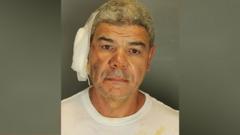Kilmar Ábrego García, a 29-year-old Salvadoran deportee mistakenly sent back to his homeland, has returned to the United States to face federal charges related to an alleged trafficking conspiracy. The government asserts he was a significant player in smuggling undocumented migrants, while his defense claims the accusations are baseless.
Controversial Return: El Salvadorian Deportee Faces Federal Charges in U.S.

Controversial Return: El Salvadorian Deportee Faces Federal Charges in U.S.
Kilmar Ábrego García, deported to El Salvador and accused of alien smuggling, returns to the U.S. amidst intense legal scrutiny.
Kilmar Ábrego García, a 29-year-old originally from El Salvador, has been brought back to the United States to face federal charges after he was mistakenly deported in March. Accused of being involved in a years-long trafficking conspiracy, García is facing two criminal charges, including conspiracy to transport undocumented aliens and unlawful transportation of these individuals.
U.S. Attorney General Pam Bondi announced the return following an agreement with El Salvador, which released García after the U.S. provided an arrest warrant. His lawyer has described the charges as "preposterous."
The White House initially resisted a U.S. Supreme Court order demanding García's return after he spent time in a Salvadoran prison with over 250 other deportees. The recent unsealing of a grand jury indictment, filed in Tennessee, details allegations that García played a "significant role" in transporting undocumented immigrants across states, claiming he made over 100 trips since 2016. The charges further suggest that he facilitated the movement of gang members associated with MS-13, a group labeled a foreign terrorist organization.
The Trump administration previously labeled García a member of MS-13, a claim he has consistently denied. Aside from the trafficking charges, the government has accused him of potentially transporting weapons and narcotics into the U.S.—though he has not been formally charged with those offenses.
Having entered the U.S. illegally as a teenager, García faced legal challenges when he was arrested in Maryland in 2019. A judge had granted him protection from deportation due to the potential threat posed by local gangs in El Salvador. His deportation in March intensified legal disputes, with significant political pressure emerging for the administration to rectify what was termed an "administrative error."
During a recent court hearing in Nashville, where he appeared for the first time since his return, the motion was made to keep him in pretrial custody, citing danger to the community and risk of flight. In response to the unfolding events, President Trump characterized García as a "bad guy," while asserting that the Department of Justice made the correct decision in bringing him back to trial.
The situation has drawn significant attention, with advocacy for García's rights gaining traction. His defense attorney, Simon Sandoval Moshenberg, condemned the circumstances of García's deportation as an "abuse of power," demanding a fair court trial that respects his rights as a defendant. As the prosecution unfolds, U.S. Senator Chris Van Hollen emphasized that the matter extends beyond García, highlighting broader concerns regarding constitutional rights for all individuals facing similar predicaments.






















